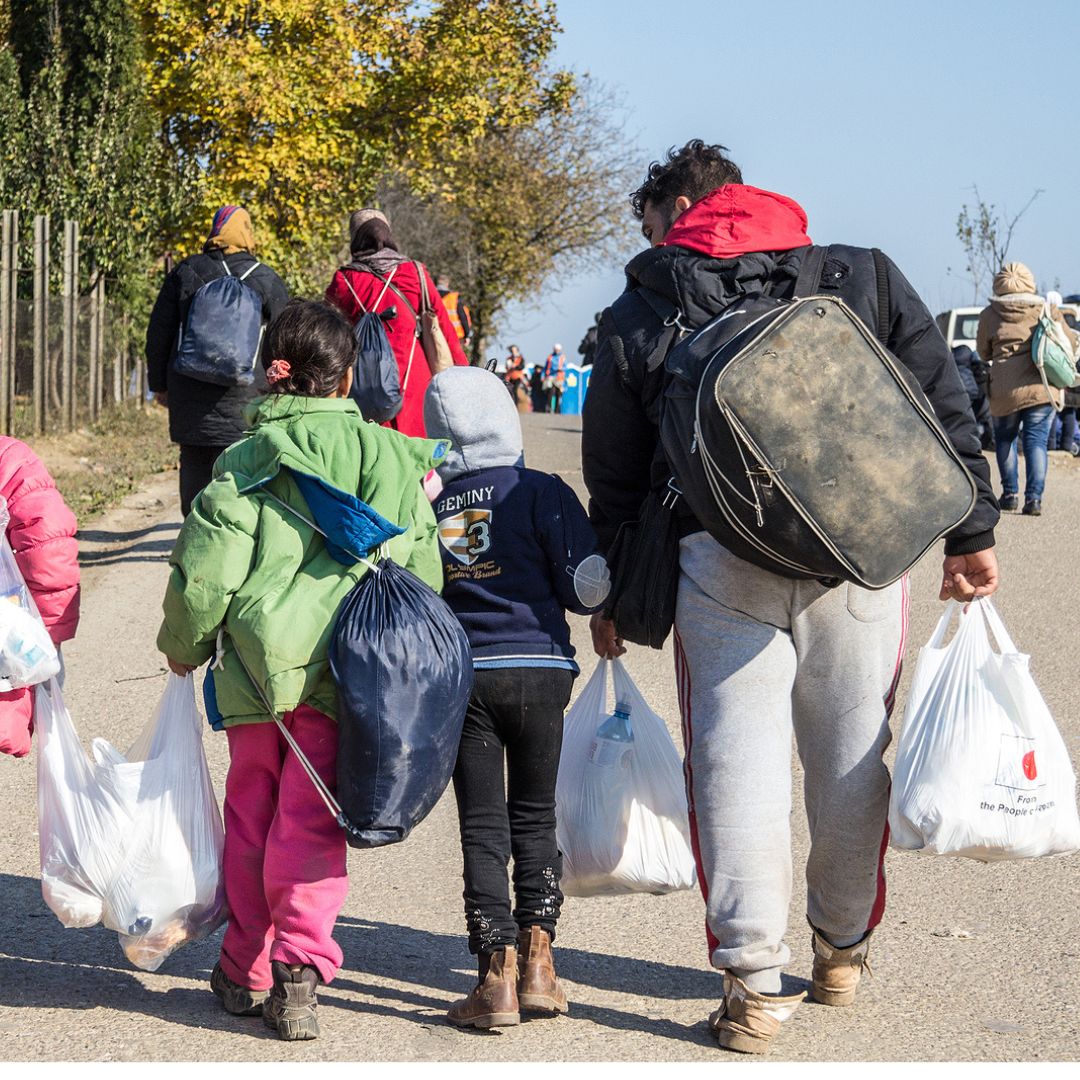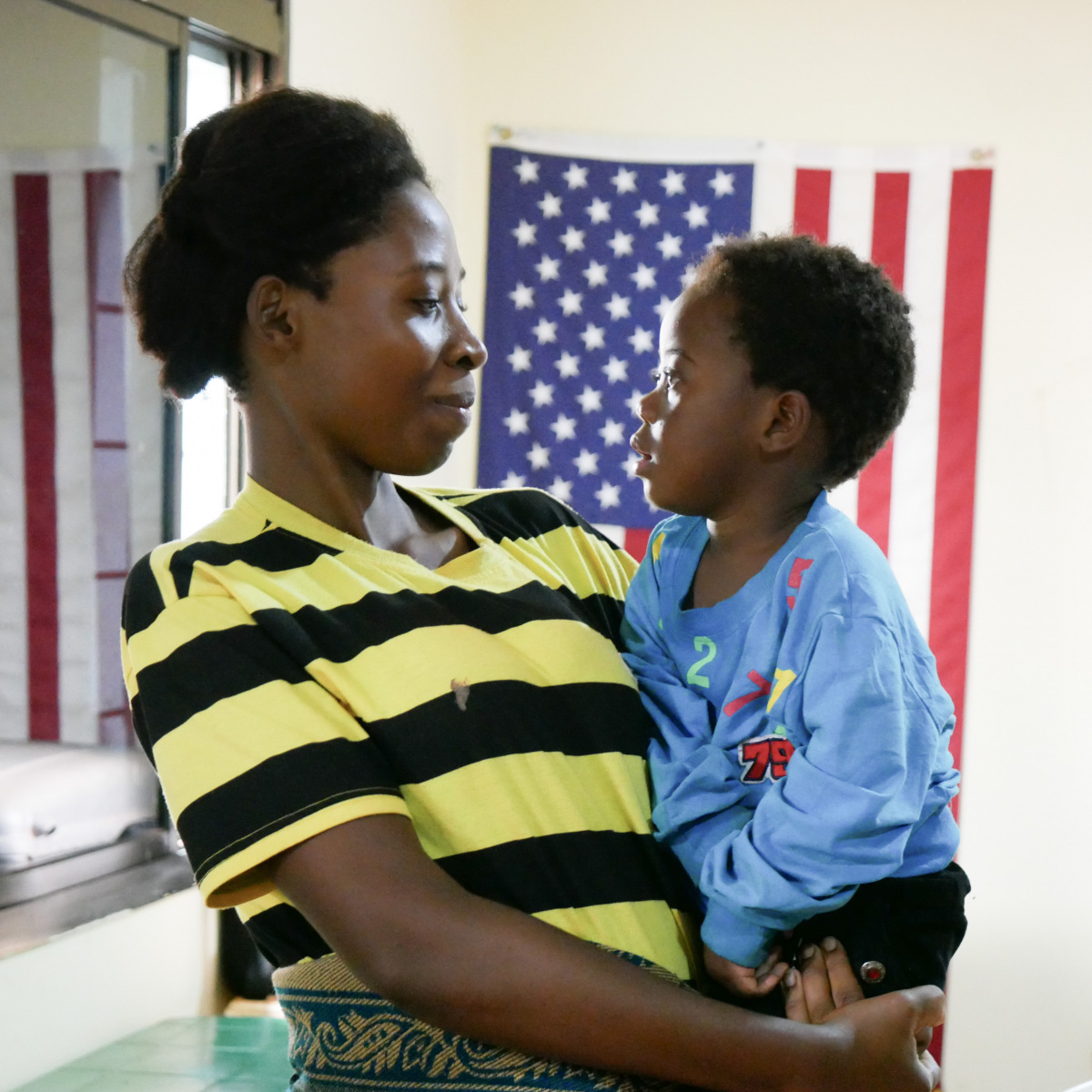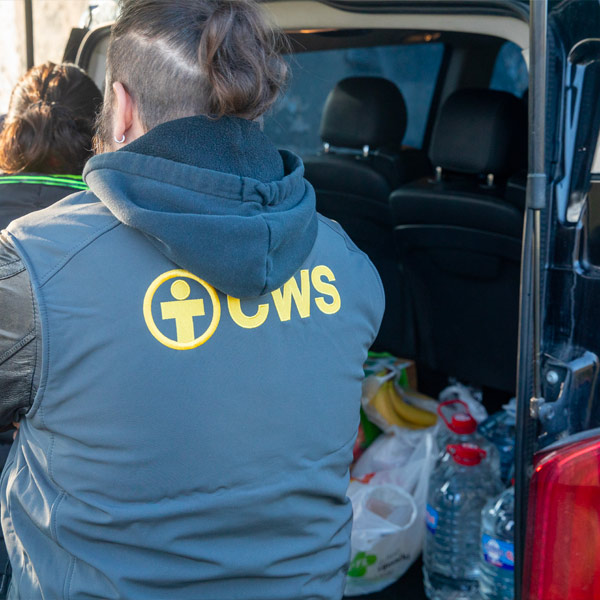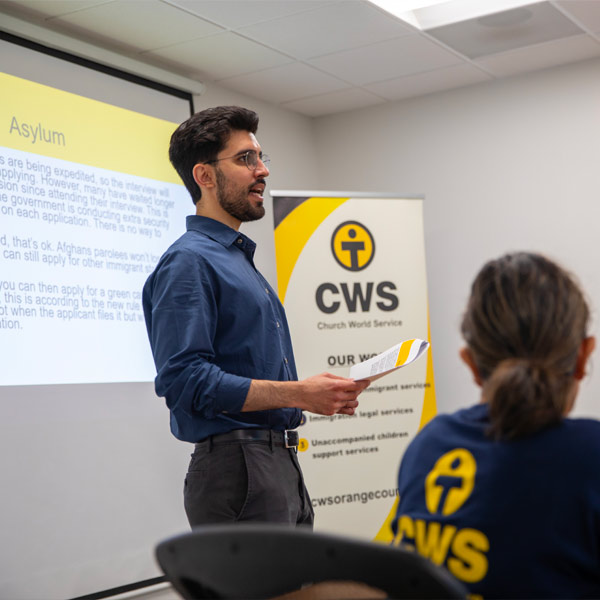We Stand with Refugees and Immigrant Communities
On January 20, 2025, President Trump indefinitely suspended the U.S. Refugee Admissions Program, stranding over 20,000 refugees—including 10,000 who had already booked flights:
Among them were the parents of Wajdi Al-Mowafak, CWS’ Director of Finance Business Partners. Wajdi, who fled war and corruption in Yemen, arrived in the U.S. in 2023 with his wife and children after years working for CWS’ partner in Cairo. He had finally secured a way to bring his elderly parents to safety through Welcome Corps. But the refugee ban shattered their plans overnight.
“They left their apartment in Egypt and sold their furniture,” Wajdi shared. His father, who has Parkinson’s, had planned to move in with him. Now, they’re stuck in limbo. “We lost the hope that they are coming.”
The ban’s impact is devastating. “Some of my colleagues in Cairo waited 23 years. Then, everything just vanished overnight.”
Though Wajdi’s family has found success in the U.S., uncertainty looms. “We are legal, but we don’t feel safe. We give our kids their green cards when they leave the house.”
The ban’s impact is devastating. “Some of my colleagues in Cairo waited 23 years. Then, everything just vanished overnight.”
Though Wajdi’s family has found success in the U.S., uncertainty looms. “We are legal, but we don’t feel safe. We give our kids their green cards when they leave the house.”
“Since the creation of the United States, its values were to protect everyone in this country. I hope those values are protected. If we continue in this direction, we are losing our values and our humanity’s values as well.”
-Wajdi AL-Mowafak, CWS’ Director of Finance Business Partners.
We need you to make your voice heard. Call on this new administration to support policies that care for the hungry and displaced. Reject misinformation and anti-immigrant speech. Instead, speak out for policies that welcome and care for new neighbors. Donate today and join us in this critical work, and stand with families in need.
The CWS Mission
Church World Service is a faith-based organization transforming communities around the globe through just and sustainable responses to hunger, poverty, displacement and disaster. We offer help to all people, regardless of their beliefs, without evangelizing or requiring a statement of faith.
Our vision is a world where everyone has food, voice and a safe place to call home.
Poverty. Disaster. Displacement.
When we team up with communities around the world, we are working together to move against hunger and poverty. We’re proud to be the toolbox communities need to make sustainable change.
As we combat these main two challenges, the community we are working with is at the helm. They weigh in on what their most urgent challenges are. As the program unfolds, CWS provides expert guidance, supplies and funding. Communities provide the time and effort to make the program successful. They care for shared gardens, help with construction, attend workshops and mobilize their neighbors.
Every two seconds, someone in the world is forced to leave their home and everything they know. With the threat of violence, persecution or disaster knocking on their door, they make the only choice they can to find safety—they run.
In recent years, fewer and fewer of the 100 million people who are forcibly displaced have access to the protection they need to rebuild their lives. Many nations that are hosting asylum seekers and refugees—including the United States—deny them access to fundamental rights and critical services or have effectively closed their borders.
We believe every family has the right to live in safety and dignity. That is why we welcome refugees and asylum seekers with open hearts and helping hands. Faith leaders and refugee communities lift their voices to advocate for better policies, and by standing in solidarity, we are helping keep immigrant families together. Whether through the U.S. asylum system or refugee resettlement program here at home, or by aiding communities overseas, we help the vulnerable build lives free from fear.
In a few minutes, your life can be torn apart. Winds, rain, waves or tremors can take away everything you love. War can erupt and completely change the life you once knew.
In the natural disaster cycle, we make sure we are with our neighbors in every stage. CWS programs help people prepare for the worst, making plans and gathering supplies.
Whether it’s a natural disaster or a humanitarian one, we team up with other responders to meet immediate needs. And when the time is right, we shift our focus to long-term recovery. When people are forced from their homes, we work hard to make sure they have safe and dignified lives.
The road to recovery and safety may be a long one, but no one should walk it alone.
CWS United States Offices
Results: Making a Difference
Over the decades, the specifics of our programs have shifted and evolved. The CWS family has grown. And our foundation of collaboration and welcome has remained unshakable. We proudly serve as the toolbox that our neighbors near and far use to build healthy, dignified and safe lives. Here are a few examples:
across 11 countries have gained better access to safe water and sanitation at home
were reached with life-saving services after a humanitarian emergency or natural disaster.
are better equipped to put food on the table through food security and livelihoods programs
We have responded to deadly emergencies in dozens of countries around the globe. In the late 1950s, serious floods hit Cuba in the midst of a political crisis. CWS provided financial support and worked with the U.S. military to airlift food, multivitamins and clothing to the island. As a severe famine swept through Ethiopia and the rest of the Horn of Africa in the 1980s, the CWS family mobilized a relief effort of over $17 million. In 2010, the world watched in horror as Haiti suffered one of the most deadly disasters in recent history during the earthquake on January 12. We responded to help people rebuild homes and livelihoods…and to make sure that they were better equipped to face the next disaster.
We have walked with families all over the world as they put food on the table, connect to clean water and build the businesses they need to thrive. CWS began to focus more and more on long-term development in the 1960s. By the late 1970s we were also building long-term programs into our disaster response work to make sure that families would not just recover but thrive. Today our food security, water, sanitation, hygiene, health and livelihood programs focus on everything from crop diversification in Honduras to renewable energy in Bosnia to water access at health posts in Myanmar.
We stand for welcome today, just like we did nearly eight decades ago. When the Refugee Act of 1980 passed, we had already resettled 350,000 refugees in communities across the United States. Today that number is over 865,000. In recent years fewer and fewer of the 100 million people who are forcibly displaced have access to the protection they need to rebuild their lives. Many nations that are hosting asylum seekers and refugees—including the United States—deny them access to fundamental rights and critical services or have effectively closed their borders.
We have worked alongside partners ranging from small community organizations to the United Nations to welcome, protect and support people on the move worldwide. In 1964, our emergency feeding program in what is now the Democratic Republic of the Congo reached 21,000 newly-arrived Angolans. We also distributed seeds and agricultural tools for longer-term food security. In the 1980s we recruited medical teams to work in refugee camps in Somalia. We have partnered with a refugee- and women-led organization in Cairo since 2013 that reaches tens of thousands of refugees annually through legal, medical, food, educational and mental health programs.
















